#no irony in his depiction as a hero
Explore tagged Tumblr posts
Text
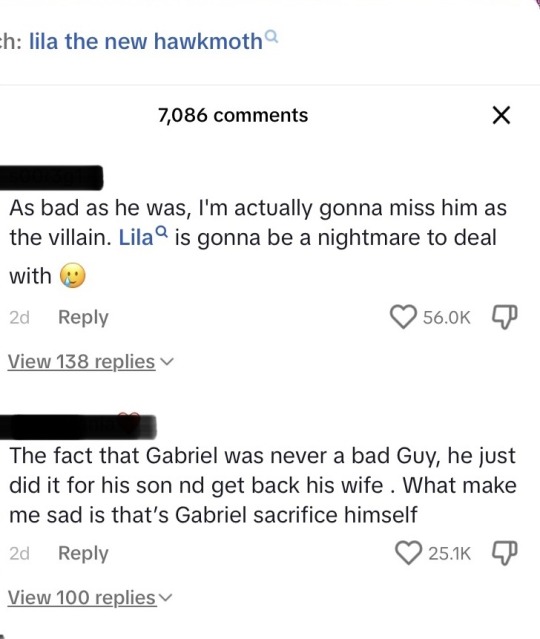
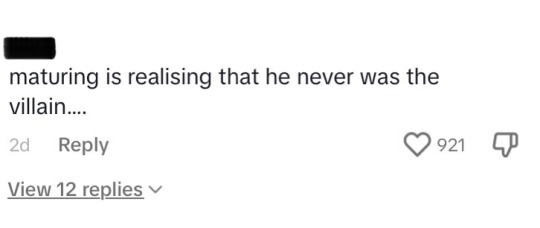




#ml#miraculous ladybug#the number of likes is bananas#I know they’re likely still teenagers and haven’t developed media literacy skills#but the writers have been so inconsistent with Gabriel’s characterization#I genuinely feel like this was supposed to be the audience take away#no irony in his depiction as a hero#Winny had once stated he related most to Gabriel because he was a father??#it may be carelessness or ignorance#but putting abusers on a pedestal is just 🫣#I feel likely I’m actively being gaslit#idk#sorry for the ramblings#I still want to write a longer in-depth analysis on the finale#once my thoughts are in order#ml spoilers#miraculous ladybug spoilers#gabriel was a selfish SOB until his last dying breath lmao
384 notes
·
View notes
Text
no, actually, where is the whimsy?
my ex had a best friend named larry who asked me once: what do you think comes after irony?
we were at the bar where larry worked. it was a quiet night, and he'd hopped over to sit with us on the patron side. i swirled the lemon around my limoncello martini.
earnest positivity, i said, while my ex said, art self-destructs.
i stared at my ex. he stared at me.
his argument was the cinemasins argument: look how bad media is becoming! look at the loopholes and the dumb shit!
it was roughly 2011. galaxy print was still in. at the time, i had a favorite shirt that was a wolf howling at the moon. it got ripped in half in the wash and i honestly still mourn it. i dressed like effie stonem, because everyone did. and irony was the name of the thing. men liked MLP "ironically." the internet liked the kind of crass, "anti-mainstream" vibes of things like fuck romance, touch my butt and buy me pizza. we put cats in sunglasses everywhere, which was because we only liked things in irony.
and media had the same vibe in it: anti-hero white men would be "hard to love" and then storm off the scene. nobody was just earnestly trying to save the world: they were jaded, angry, unoriginal. mad you even asked them to try to help.
my ex ends up not being wrong. cinemasins becomes super popular. a lot of people start viewing media with this lens that is the cruelest, most jaded depiction. it's wrong for your character to have unexplained powers, even if the entire movie is about how strange it is she has unexplained powers - that is still considered a "loophole." characters make thoughtless, panicked choices? loophole. characters are actually kind people, despite hardship? loophole. features a woman doing literally anything without assistance? loophole. movies become hyper-aware of scrutiny, and now irony rules the media.
which means you go to a movie, and the character has to turn to the screen and say "beats me!!" or one of the side characters has to have some kind of quip like "are you seriously telling me that you think this is normal?" because nothing can happen in earnest. like a sitcom laugh track, we now anticipate the fourth-wall break: the moment that the media acknowledges it is telling a story. the media has to apologize for itself, or else someone like my ex rolls their eyes.
but here's the thing: i wasn't wrong either.
the difference might be that i am (and always have been) so soft-hearted that any crack in the light of this world will spear me into the ground. and i was the poet in the relationship. (he thought that was the same thing as being naïve and stupid). i was making things daily. i knew how all of us artists are driven by some strange desire to evolve. he notably liked to critique art, not to create it.
so yes, i've made things that are bitter and angry and even ironic. i've made long, sharp poems with all capital letters, and i've made poems about how the silence stretches out like a song. someone wrote once that we will spend our whole lives just circling the place we grew up. i think it's more that we spend our whole lives trying to remake a home. i think it's that as we age, it becomes less exciting to build the castle on the beach - we become aware of erosion, of windforce. we realize what we really want is to come home to our dog, castle or not.
and while art in the foreground is mired in white male violence and irony, and aggression, and not taking anything seriously - i don't think that's true of all art. i think more and more artists are leaning in to the things we love. the world has changed so much. they have taken so many things from us. the only thing we have left is love. at the bottom of the moving box - all we get is the faint sense that we have to appreciate what little we've got. i can't enjoy this stuff ironically anymore: what room do i have for irony? if it makes me happy, that is an amazing thing. there are so few happy places left for me. i want to be happy because of how leaves shiver beside each other like nestling birds. i want to be happy because of the color pink, and how magenta doesn't exist. i have spent so much of this life suffering, i have earned my right to a gentle ending. if nothing matters, i get to assign meaning to the nothing. i get to create meaning. i am an artist first and foremost, which means creation is my thing.
where is the whimsy? wherever i fucking put it. because if this is my last fucking chance to do any good in this world - i want to do it earnestly. i want to write things that make you happy. that make people feel heard and seen. what comes after irony has to be positivity.
it was close to my 21st birthday. in 7 years, i would end up writing a book about this relationship, which is hopefully coming out somewhere around May 2024. i come back to this bar scene in my memories a lot. i keep thinking of how pale my ex was. the look that crossed his face. how i looked back at him. how for a moment, both of us couldn't recognize the other person. like the gulf between us was a suddenly wide and cavernous thing. like we were alien to each other. he never took my opinion seriously, and he always seemed surprised whenever his manic-pixie-dream-girl ever broke free of the plot. like in the whole time we were together, i wasn't human enough.
this knowledge: where he said nothing comes after, my only instinct was what comes after is love.
#spilled ink#writeblr#this is a real story lol#looking back i liked larry as a person SO much more than my ex hollyyyyy shitttt#compulsory heterosexuality will do you DIRTY#edit to correct effies name my apologies to effie and effies family
14K notes
·
View notes
Text
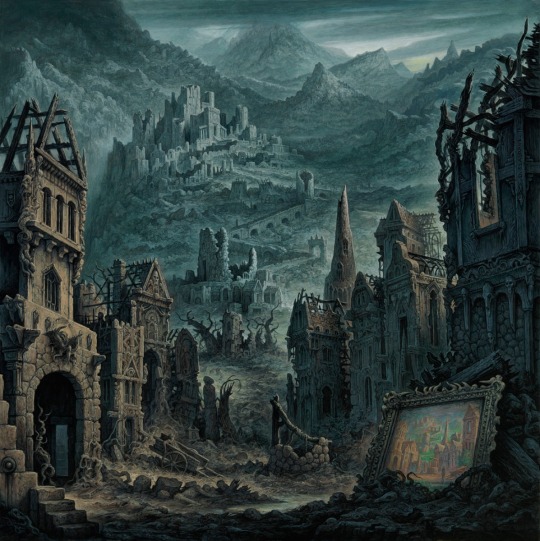
Dungeon: A Bleak Picture
Unsure whether they've been trapped inside a painting or been cast back in time, the party must venture through the desolate ruins of a once warm and familiar place to rescue a number of innocents that've gone missing after being abducted by some shadowy force.
Adventure Hooks:
The party arrive in the town of Valasren on innocuous business, following the rumors of a ruin, attending a nearby shrine, or visiting some old friends. When they arrive they're given an unexpectedly amiable welcome by lord Lucas Kevral, who's heard of their earlier exploits and wants to cultivate a good relationship with such aspiring heroes. While taking him up on an invitation to dine at his castle, the party spy a gloomy painting depicting Valasren in ruins. Lord Kevral explains that it was painted to commemorate the near destruction of the town some generations ago, when one of his ancestors left the settlement defenceless to go off seeking glory in war. His grandmother commissioned the painting from one of the survivors, and hung it in a place of honour so she nor any of her descendants would forget their duty to defend the people.
As the party pursue their mission around Valasren they'll begin to notice a number of disappearances that only seems to climb as time ticks on. Rumors begin to circulate about something moving in the night, stalking people, creeping into their homes when they're asleep, leaving only open doors and empty beds come daylight. These rumours become all too real when the party awake one morning to find one of their number missing, taken without a whisper from where they slept. A scattering of untrustworthy witnesses say they saw an unnatural figure carrying a sack up the hill towards the Lord's castle, giving them at least a ghost of a trail.
Following the trail back to the palace eventually leads the party to the painting, an inexplicable cold draft intermittently drifting from its now permeable surface.
Background: The painter who witnessed the destruction of Valasren was a true master, and was years later able to immortalize the hopelessness they felt in that moment through their skill with the brush. There is power in such emotional resonance, and transformed the painting into an overlap with the shadowfell, where the town's sorrow had likewise been reflected. Not quite a portal, the painting never did much harm but making the already drafty castle hall a little more cold and unwelcoming at night, at least until recent days.
Drawn by the warmth of life and merriment on the air, A Snatcher has discovered the painting and forced its way through, one by one dragging inhabitants of Valasren into the upside down for an unknown purpose.
Challenges & Complications:
Once the party figure out there's something up with the painting, cut to the abducted player waking up in the ruined shadow-town. There's no corresponding painting anywhere to be seen, and because they were taken while they were asleep they're likely a bit exhausted and missing most of their gear. They'll have to be quiet and clever to escape the nightmare things and lingering spirits that dwell within Valasren's shadow, but doing so may give them vital clues about what's really going on. Keep the tension on until the isolated hero is backed into a corner, then have the rest of their friends arrive.
It's a grim irony that before war came to Valasren, the painter was working on capturing the beauty and peace of their home town on canvas, only for that work to be destroyed in the town's raising. Thinking it lost forever, the painter added it in as a detail nearby the burnt out remains of their workshop as a meditation on the happiness thought taken from them. Like many things lost to the mortal world, an echo of the painting has come to reside in the shadowfell, and acts as the exit portal back into the land of light. Finding it though is a problem, the snatcher has removed it from it's resting place and given it over to the terrible entity lairing in the castle. Where they've put it, who can say?
Numerous townsfolk have been pulled into the shadowfell and are scattered about the echo of a place they thought they knew. Lost, affraid, and isolated, many of them have run for cover or have started to sink into the spirit siphoning torpor that afflicts all to dwell too long in shadow.
Extra special thanks to @dm-tuz , who's monsters are ALWAYS an inspiration.
Artsource
194 notes
·
View notes
Text
Batman: Caped Crusader, Episodes 1-2 thoughts (SPOILERS)
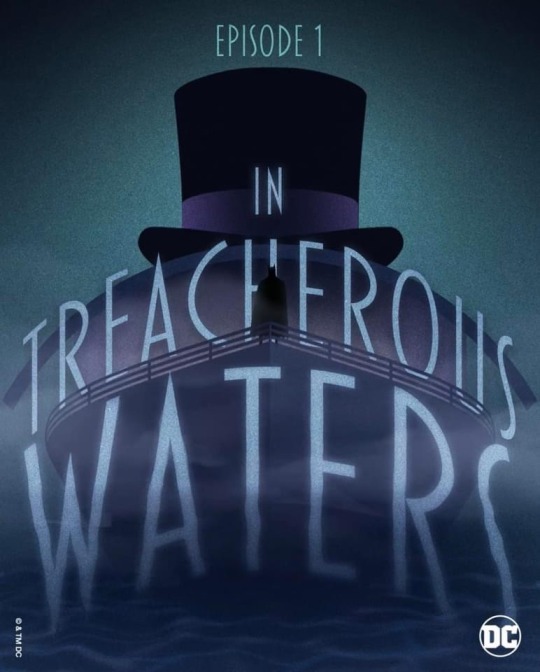
First things first, Harvey is as bad as I’d expected. I honestly can’t tell whether this is worse than the version we got in the last Timm-produced animated Batman show, “Beware the Batman.” That Harvey was a humorless prick straight out of the William Atherton school of jerkasses, while this one is a smug sleazebag who would be someone you’d love to hate if he weren’t also a complete inversion of a great tragic hero turned villain.
I’m just so sick of people portraying Harvey as a politician first and foremost, performing for the cameras and thinking about his career ambitions. I’m sick of him being a corrupt asshole and even an authoritarian. I’m sick him being two-faced, when the irony of his character is that he himself never WAS. Now that that’s out of my system, I’ll move on, because I know he has an arc in store that may prove more interesting than the usual Asshole Harvey takes.
They tried several things with the Penguin, and I’m not sure they gelled into anything that worked for me this time out. Making her a woman, that’s no problem, and I appreciate her classic style and appearance in a time when everyone just wants to turn Cobblepot into a boring Tony Soprano knockoff.
Ultimately, though, it all just served to make her a standard “Ma Barker” archetype. You know, the alleged matriarchal crime boss who was killed by Hoover’s FBI, who may have dragged her name through the mud to excuse their killing of an old woman? There used to be several takes on her in pop culture, although nowadays the only famous one is probably Ma Beagle from “DuckTales.”
With that in mind, they should have just cast Margo Martindale. Excuse me, didn’t use her full name: Beloved Character Actress Margo Martindale. Minnie Driver is a fantastic actress (I’m still mad that “The Riches” was not only cancelled but totally forgotten), but it was a waste not to let her use her real accent. As it was, she was fine, but she didn’t bring anything special to match the physical design. As an actress, she deserved more to play with.
Also, “Oswalda” is a terrible fake name. Like come on guys, you can do better. That’s on par with Revolver Ocelot’s real Russian name being “Adamska.”
The biggest problem with this take on Penguin is that she’s set up as some kind of brilliant mastermind, only to act incredibly stupid, reckless, and gullible. She kills not one but two innocent goons, including her own son, without so much as an investigation or even keeping tabs on the suspected rats to use them as pawns against Thorne! To paraphrase Dijkstra from the “Witcher” books, you don’t kill spies, you USE them. You feed them misinformation! You blackmail them into being double agents! This Penguin is bad at her job, so no wonder she loses everything within hours. It’s amazing she was able to build a crime empire in the first place!
I also dislike Bullock being a corrupt cop in the mob’s pocket. That fits Flass perfectly, but Bullock? Fuck no. Bullock IS dirty, but he’s dirty in a very acceptable way to cops. He’s brutal, he cuts corners, he’s crass, and he’s probably not above planting or concealing evidence, but selling out to the mob? Hell no. That’s just wrong. Hate that choice. Unless it’s a misdirection. This show sure does love its misdirections from what I’ve seen so far.
Batman himself is… fine. He’s Batman. He’s not a bad Batman. He’s serviceable but unremarkable. But at least he wasn’t an irritating asshole, which is more than I can say for most Batman depictions these days. I liked Bruce trying his “falling off a boat” joke a second time, delivered verbatim after it flopped with Barbara.
Barbara being a defense attorney is a rather contrived choice, one that gets to put her at odds with Harvey while also giving her a professional in with both Batman and Gordon. Essentially, she’s in the role Harvey Dent is supposed to play. Except here she’s a defense attorney, which SHOULD put her at odds with her dad, since lawyers and cops don’t seem to like one another, for SOME reason!
And Harvey, even as District Attorney, can’t be in the role of legal ally to either Gordon, because the story is far more focused on making him a mayoral candidate who throws people under the bus for his own advancement! Feh.
Anyway, that was episode one. It was fine, I guess.
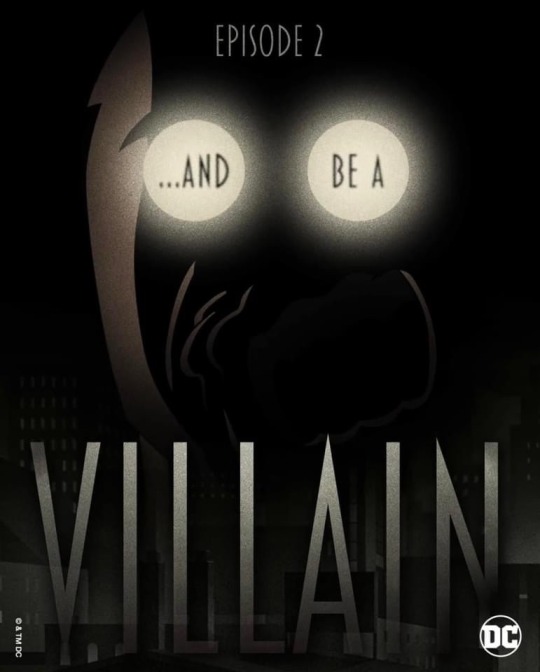
The screenplay is by novelist and DC veteran Greg Rucka, so of course Renee Montoya is the central focus. Seeing her interact with Sleazebag Harvey gave me war flashbacks to what Rucka did with Renee and Harvey in the comics: setting them up with a poignant dynamic of tenuous respect and kindness before dashing it all with “Gotham Central: Half a Life,” which solidified the perception of Harvey as a creepy, obsessive stalker for a generation of fans. That version of them was very much of display here. Sigh.
Also, Lucius Fox is Bruce’s lawyer now? Why? And also, what the hell? God, poor Lucius. He starts off in comics as the guy actually running Wayne Enterprises, then “Batman: The Animated Series” makes him Bruce’s right-hand-man, then Nolan and Goyer get the inspired idea to make him the Q to Bruce’s 007, while the comics don’t know what to do with him and even make him an authoritarian to cause friction with his vigilante son, and now this? It’s such a random choice. There’s no reason why this character should be Lucius. Hell, Lucius could have shown up there WITH the lawyer and that would have been fine. As it is, it’s just weird.
That said! I overall liked this episode an awful lot! For DECADES now, I’ve wanted to see someone remember that Basil Karlo was an older actor in the classic horror movie vein (his name is literally a combination of Basil Rathbone and Boris Karloff), but ever since “Batman: The Animated Series,” everyone has just tried to make him BTAS’ Matt Hagen. Like, I really liked the “One Bad Day” issue for Clayface, where he gradually killed his way to the top of Hollywood stardom, but even that was still BTAS Hagen, the Serious Actor, not Karlo, the old horror ham actor.
But with this episode, someone finally drew on the old Hollywood horror roots of the character, and they found a way to combine his shape shifting abilities into the mix! I’m so happy!
Of course, this is me, so I still have criticisms. Like, I think it was unnecessary to frame it as a mystery, because that added unnecessary complications. I know the original Clayface story was a whodunnit and you can’t do that now that everyone knows that Karlo is Clayface. I was annoyed by the misdirection of Karlo’s “death,” in part because I feared this would be another Clever Subversion, just like how the animated adaptations of “Gotham By Gaslight,” “Hush,” and “The Long Halloween” purposely went against expectations from the source material in stupid ways. Hell, they’re doing the same thing now with Penguin (“But wait, there’s a twist: she’s a woman!”) and Harvey (“But wait, there’s a twist: he’s an asshole!”), so I was afraid this Clayface would end up being someone else entirely. I was okay with it in the end, but I’m annoyed at the cheap fakeout as a plot point.
Furthermore, I don’t get why Basil disguised himself as the doctor (whose name I don’t remember) for the benefit of the actress (whose name I don’t remember) he had chained up in his hideout. What benefit was there in making her think he was the doctor? She was already aware she was a prisoner and was scared, so why the facade? It served no purpose in context, only just to misdirect the viewers.
This is what happens when you try to make something a mystery when it would work better as a thriller. Stop trying to wow audiences with twists and surprises when you could just be focusing on telling a good story. So what if everyone figures out Karlo is Clayface? Who cares! Just go with it! Let them be in on it while Batman and Montoya figure it out themselves, that’s where the tension lies! Stop trying to be clever.
Regardless, I really liked this episode. I want this to now be the canon comics origin for Basil Karlo’s Clayface. Just explain that the treatments for his face gradually affected his whole body, and boom, you’ve successfully explained how classic Slasher Clayface became Mud Monster Clayface. This is how Karlo should always be written from now on. If you really want a sensitive, angsty lug Clayface, bring back Hagen. Let Karlo be the gloriously hammy monster with aspirations of stardom.
#batman#batman caped crusader#harvey dent#oswalda cobblepot#oswald cobblepot#penguin#the penguin#clayface#basil karlo#barbara gordon#batgirl#lucius fox
70 notes
·
View notes
Note
Snow Elf culture?
*pulls up a chair*
Perhaps...
A wee disclaimer that I'm not particularly good or creative with developing cultures or societies, but my brain has just latched on to the snow elves in a way where I can't stop myself. But anyway

I developed a lot of this because of a big ass draft for a fic I've been writing on and off about Gelebor and Vyrthur, so a lot of my headcanons are religion heavy. I'll start there:
Gelebor seems to place Auri-El and the Chantry of Auri-El as having significant importance to the Snow Elves over the other gods/temples. He's probably got a bit of bias in that regard since he's devoted his life to Auri-El, but in order to differentiate their religion from the other elven ones I like to think that their religion in general worshipped Auri-El as not even just as the figure head of their pantheon, but almost monotheistical, while the other gods (Trinimac, Syrabane, Jephre and Phynaster according to Gelebor) were like minor divine figures or just legendary heroes even more than in Altmer myth, depending on the interpretation. My idea is that if their culture had been allowed to continue on, it would've eventually become monotheistic, but by the arrival of the Nords they were in a bit of an awkward transition period with it.
I also like to lean into the sun motif with Auri-El that they established in Dawnguard and with Auriel's Bow, partially because it's another thing to make their depiction of him more unique, and in part because it makes some very juicy irony for Vyrthur. Some ideas include:
- The more religious folk tend to pray at noon when the sun is at it's highest. - The two biggest snow elf festivals happen on the summer and winter solstices. As far north as they are, the summer solstice is during a time of year where the sun barely sets and the winter one is during a time of year where it barely rises. The summer one is more jovial and celebratory, with a grand feast. With almost 24 hours of daylight, the festivities last up to three days straight, with folks commonly staying awake for over 24 hours. Most of it is spent outside, with the celebration being focused on making the most of the weather and daylight hours to spend as much time in the sun and the light of Auri-El as possible. The winter festival is as large scale but lasts longer and is lower-key. It also involves a feast but features more winter foods and meat and alcohol. It is more pensive. At this point in the year, there is no full daylight, and so this season is seen as a test of one’s faith and mental fortitude. This festival acts as a break from this trying time, taking time to relax, build community (a strong community will allow them to make it through the winter and strengthen their minds), and bond with family and friends. It is about a weeklong break, where leading up to the festival everyone works harder to prepare for it and allow themselves to have the break. There are activities and festivities, but they remain indoors for the most part and are smaller. - I've referenced this before, but with long winters with little sunlight (due to harsh weather and short days), they see that time of year as a reflective test of will and faith.
Due to their proximity to dragons, it was hard to miss the connection between Auri-El (/Akatosh) and dragons, and so their depiction of Auri-El is either much more influenced by the iconography of dragons, or is a dragon (although their depiction of dragon Auri-El is much more benevolent than the Nord/Atmoran one). I got the idea for this one from this Reddit post (i know I dog on Reddit a lot but this one has got some fun stuff in it, even if it's a bit out there)
^On that note, later in the timeline (post Dragon War (the timeline is very fuzzy on when this and the Night of Tear happens. They are both sometime vaguely in the late Merethic Era I believe, but it's unclear which happens first or how long each conflict is)) some Snow Elves see a sort of unreturned, unofficial comradery with dragons, seeing themselves as both on the receiving end of the Nord's/Atmoran's brutality (disregarding whether it was warranted or not in the context of the Dragon War).
Ok here's some more general cultural ones:
I mentioned my reasoning for this in this post, but I like to think their general settlements were not as permanent, with a larger focus on wood and building into the sides of hills (good for warmth), while their temples tended to be made of stone and much more permanent. This is why there are so few identifiable Snow Elf ruins across Skyrim. Their cities and towns were easy to wipe out, scavenged for resources, or were in good places for Nordic cities (perhaps Bromjunaar was originally the site of a Snow Elf city?), and their temples were either very hidden (e.g. the Chantry of Auri-El) or eventually converted to Nordic temples.
I love this journal in general for gleaning ideas for Snow Elf headcanons for, but one interesting this is the use of "Old Ones" and "Young One". They're treated like established titles. From that I like to think they place a lot of emphasis on the respect of those older than you. The social hierarchy and whose opinions are most valued is heavily influenced by age. Folks call anyone older or more revered “Old Ones” as a term of respect, and anyone younger than them “Young Ones”. Old One is almost never used in a demeaning way, but Young One can be (not always). Typically, “Old Ones” is used in the third person (e.g. you wouldn’t refer to someone directly as “old one”) whole “Young One(s)” can be used as an epithet for someone directly or in third person.
When thinking about death/"burial" customs (needed for some scenes in the fic I'm planning), you have to consider that there probably wasn't a lot of land in a place like Skyrim where someone can be buried. Nords intern their dead in crypts or burn them to get around this, and I like to think Snow Elves participated in something akin to sky burials (at least sometimes). After preparation, the departed's body is left outside on a ledge, cliff, or the temple balcony to be scavenged by birds. This is seen as a metaphorical return to Aetherius, while their soul literally returns to it. They do this even in poor weather or deep winter. If it doesn’t thaw and rot/be scavenged until months later, so be it. The length it takes to rot is considered indicative of how long it takes for the spirit to let go and move on (not in a bad way though. It’s interpreted more in the way of the soul or body grieving). It's seen as if they may wish to wait until spring to finally rot if they want to experience one more warm, sunny day.
Food (I mostly wrote this in my notes in the context of the Forgotten Vale and Chantry of Auri-El, but I think it could work elsewhere as well to an extent): Plant-based food is grown in gardens in the spring and summer, and that that is able to be stored is carefully preserved through the fall and winter. Winter foods include some nuts, dried vegetables, and dried and preserved/fermented grains (like wheat, barely). These foods must be eaten slowly throughout the winter to last, and winter diets are more meat based. Summer foods include apples, cabbage/lettuce, leeks, tomatoes etc. Snowberries can be found in the wild out of season of most other fruits, and provide fruit in very early spring. Occasionally, fungus from caves is harvested, but this is seen as a delicacy (foreshadowing).
Ok, that's it for now. I gotta go to bed. Thanks for the ask!!!! :D
#charlie its always sunny in philadelphia voice 'can we talk about falmer please ive been dying to talk about falmer all day'#mine#ask#tes#skyrim#the elder scrolls#snow elf#snow elves#reading my notes doc while making this and i was really cooking on some things. didnt include them all becasue some are very specific for#that fic i keep referencing#like i had to try to elaborate on the religious hierarchies and duties of each position because that was obviously gonna be relevant#but its sorta half baked rn#also i want to have some more headcanons for later in case someone asks again :)
83 notes
·
View notes
Text
Kyouka: Friendzoned and friendzoning
So. Jirou seems to be the female classmate who the majority of 1-A's guys are most comfortable with.
However, contrary to my headcanon about the most popular 1-A guys, I feel like most of them aren't romantically interested in her.
It might sound a bit sad, but I headcanon that her miffedness about Mineta not naming her among those female classmateds that he wanted to perv on, is not entirely unwarranted... although, having Mineta salivating over you, is probably not something that anyone with self-respect should desire.

I can see her having gained some male admirers outside of the hero students, after the cultural festival.
At first sight, it might seem that Hagakure and Ashido are the most romance-focused girls in 1-A. However, supplemental and canon materials have depicted the tomboyish Jirou as being conscious about the male gender, the most:
During 1-A's practice match against Togata, she was the only girl who completely freaked out over his nudity.
In one of the drama CD stories, she made a big deal inside her head about holding onto the hem of Tokoyami's uniform, when they visited a haunted house together.
In one of the gag comics, she thought that Bakugou was self-conscious about holding her a girl's hands, when he wasn't actually. She basically just self-projected onto him.
In several of the gag comics, Jirou has been depicted as being self-conscious around Kirishima: One example has her perving on him in his costume. Another one, that retold 1-A's trip to the mall before Deku got accosted by Shigaraki, has Jirou imagining being on a date with Kirishima, when the kids paired up to look for Deku... and be pissed, when Kirishima dropped her at the first sight of Bakugou.
Ironically enough, she displays none of that awareness around guys who were hinted as having some interest in her: Kaminari (and I think, I've read something somewhere about Kouda liking her since their practical exams?)
Oh Jirou. You're definitely among those 1-A kids, who have the most growing up to do in the romantic department.
...
I just noticed that, except for Togata, all of the examples above include guys with whom Kaminari is explicitly friends with.
And now I headcanon poor Kaminari getting friendzoned by Jirou until at least until graduation.
The irony of 1-A’s resident flirt being canonically the first one out of all of 1-A’s boys who recognizes that he had fallen for someone: The girl, who just goes through successively crushing on all of his close friends... Now who's the flighty one, huh?
Yes, I imagine the unrequited love switcheroo trope, where Jirou won’t be able to recognize and acknowledge her own feelings for Kaminari for a while. She starts to consciously takes notice of him as a romantic prospect - juuust right when he's about to move on from his own feelings for her.
Drama ensues.
#bnha#mha#mha thoughtbunnies#mha ships#class 1a#jirou kyouka#tokojirou#bakujirou#kirijirou#kamijirou#koudajirou#jirou kyouka headcanon#kaminari denki headcanon#kamijirou headcanon
67 notes
·
View notes
Note
How was Iron Man thought of by comics readers, before the movie? I've heard different takes, from him being despised to being generally popular.
This is one of those that really changes depending on the era you're talking about. It is true that, overall, Iron Man was not a particularly well-loved or important character before the movie.
Indeed, I would argue he was kind of the bottom of the C-tier. Yes, he was a founding Avenger and he had some solo stories people liked, but he also fucked off out of the Avengers after #16 (because of a weird Stan Lee idea), and wound up leading the West Coast Avengers who were sort of an in-universe joke, very much the also-rans to the Avengers (who weren't particularly that big either). There was likewise a running gag about villains finding it embarassing to lose a fight to "Old Shellhead."
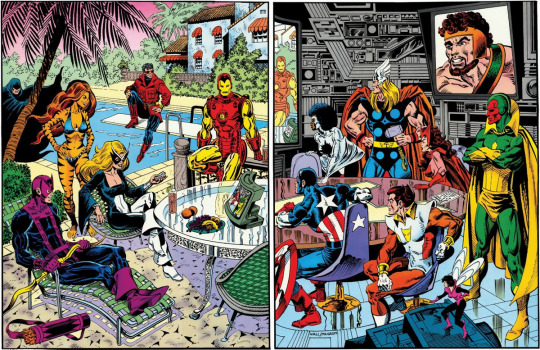
But he wasn't despised, just kind of inessential and overshadowed by more prominent heroes. This would change in 2002 with the creation of the Ultimates and the Ultimate Universe.
Now, I fucking hate Mark Millar's work, but credit where credit is due: he made Tony Stark a main character when he had not been one before, and the movie would not have happened without his inspiration (although I'd argue there was a lot of sifting the pure from the dross on that one).
One of the ironies of the MCU, though, is that it got its liftoff from Iron Man just at the point where the comics had reached Peak Tony and fans really turned against him during Civil War. Mark Millar might have thought that the Pro-Registration side was self-evidently in the right, but no one agreed with him - especially once he started building interdimensional black site prisons for superheroes, recruiting supervillains to work for the government, and creating a murderous Thor clone. Not only did the fans hate him, but pretty much all of his old friends now considered him a traitor - and Marvel pretty much had to kill Tony and replace him with a pre-fash AI backup, then have Tony be the leader of the "good" side in Civil War II, to deal with the backlash.
(Incidentally, I would argue that Hickman's Avengers run did a way better job with Millar's concept than Millar ever could.)
This is why Captain America: Civil War ended up being a second take for the concept, where both sides were depicted as more reasonable in their motivations and actions than in the comics that inspired the movie, and then Infinity War and Endgame recontextualized Tony as a tragic character who ultimately managed to redeem himself with a heroic sacrifice. (Although since then, they really have gone too far with his canonization.)
57 notes
·
View notes
Text
so that one Youtuber I Don't Like has recently decided to hate on fullmetal alchemist brotherhood and I'm waiting for the inevitable onslaught against her from the people who get up in arms in its defense (and honestly it seems like a logical escalation for this particular person to do, since she seems to be activately hating on popular things solely for the anger responses)
but the funniest thing to me is that she dropped the series after the third episode, and says the show is torture porn because of the fate of Nina and Alexander, and you know what's genuinely funny to me?
if you're actively mocking a series for rage bait, or looking for excuses to moralize about why its Bad Actually, dropping Fullmetal Alchemist on the episode immediately before the revelation that the Scarred Ishvalan is one of the last survivors of a nation forcibly annexed by Amestris and then almost wiped out in an intentional genocide in which most of the named military characters are explicitly complicit in
that is genuinely one of the funniest ironies i've seen in a while, especially since now this Youtuber is harping on about the Nina thing and its funny because in the broad scope of FMA, its a pretty minor thing
its important, yeah. its a massive influence on Ed and Al's story, and its instrumental in knocking Ed off his high horse and setting up his later character development as he finds his alchemic powers are pointless compared to Winry's ability to build new hands and save lives, and more
but again, a youtuber famous for being hostile towards series by takign the absolute most extreme, hate-filled interpretations of them imaginable and is notorious for moralizing dropped FMA right before the reveal about the canonical genocide that's a really big deal in the plot
and apparently she's also notoriously snappy about any series that depicts resistance fighters in a poor light or has revolutionaries be anything less than squeaky clean perfect heroes, so again its genuinely shocking she dropped the series before the Scarred Ishvalan's complex character and retribution actually got really showed on screen
17 notes
·
View notes
Text

Things that went through my head while watching this episode: --Herein lies the biggest irony about Hantengu: His transformation into something reminiscent of a Buddhist deity; the sort of fierce and menacing kind that uses violence for justice. Zouhakuten is as convinced of his own righteousness as much as Hantengu is convinced of his own self-pity, and this is what Tanjiro is unable to stomach about him. Tanjiro cares about the strong defending the weak, so it's not just all the lives Hantengu has stolen, it's his blasphemy that makes him hate him.
--In a Kimetsu Kindergarten AU, I want to see Tanjiro and Rui and Zouhakuten all get into schoolyard arguments all the time.
--For as much as I've been appreciating the irony of Hantengu this time around, I do not consider myself well-versed enough in Buddhist iconography to do any detailed analysis of Zouhakuten's character design and name (yet), but suffice to this: The tengu references in Ki-Do-Ai-Raku's designs also borrow from the attire used in practicing Shugendo, because tengu are often depicted as and associated with Shugendo practitioners. Shugendo is a mountain ascetic religion with multiple influences, including Buddhist, and Zouhakuten looks like the sort of deity Shugendo practitioners might encounter in the mountains.
--But if anyone in this episode lives up to the Shugendo ideal, it is Haganezuka. That Taisho Secret with his extreme physical and spiritual preparation? That's what I mean, right there. That hyperfocus, though? If I were to diagnose one character in this series as neurodivergent, it is Haganezuka-san, and that maybe be part of where he gets his hyperfocus. Still, it's built into the plot that he prepared to put his life on the line for this endeavor, so I also give him credit for having also practiced spiritual mastery! For when it counts, anyway. Swords are the only time when it counts.
--Muichiro--both physically and spiritually-- was very vividly saved by Kotetsu's actions, but Haganezuka also deserves credit for having been the perfect person to exploit Gyokko's weakness--his pride as an artist. (You get a 'you tried' gold star, Kanamori-san--for now, because the sword you smithed saves the day later. Truly, everyone's actions are important!).
--Might I just say--OWWWW, Kotetsu's solar plexus might not have been punctured, but that's gotta hurt. And speaking of getting punctured, MUICHIRO FELL FLAT ON THOSE NEEDLES HE STILL HAD STUCK TO THE FROM OF HIM, OW OW OW OW OW OW OW
--The fact that Rengoku-san's tsuba was what saved Kotetsu is another why reason I really, really wanna see Senjuro and Kotetsu become penpals
--I like that even though Tanjiro and Mr. Tokito have a resemblance, Mr. Tokito sounds like a dad. But Tanjiro has so many bags around his eyes in comparison--Mr. Tokito is so much better rested! I guess he's resting in peace.
--I love this bitter side of Muichiro. It's not simply that he picked up a sharp tongue from Yuichiro, but instead, a utilitarian outlook on the world that makes him quick to judge others--or himself--as incapable. Mr. Tokito's words really were such gentle and chiding guidance. I wonder what Yuichiro's reaction to their dad was if he ever tried to have a similar teaching moment with him?
--Jumping back to the first half of this episode, making Tanjiro and Genya barely able to stand under the pressure of Zouhakuten is, well, sort of a convenient way of portraying "look he is powerful" and "now we have the hero converse with a demon." It's not quite as memorable as other times this happens in the series, but it is a signature part of KnY for this to happen.
--Another big difference between Tanjiro and Genya, at least in displaying their potential as Pillars (which Genya agonizingly recognized in the previous episode that he doesn't possess), is that while Genya spend a lot of time thinking "WTF!? W... T... F?!? WTF!!! WTFWTFWTFWTF!!!" Tanjiro is already back to rolling with the new situation. The fact that Tanjiro wasn't killed instantly by those wooden serpents was because he possessed the peace of mind to grab on and use his chances and move around to where there were pockets of safety. If Genya were in that position, he'd probably just take the hit and then flop around until his body regenerates. Likewise, Tanjiro's ability to sense unique demons, their locations, and how powerful they are is something he has continually developed, so he had a general idea how Zouhakuten came to be, but Genya needed to witness it. Again, like started in the last episode, Genya deserves a lot of credit for how hard he's worked and how much more he's able to do than just munch. Even in demon mode here, he mostly uses demon mode for the regenerative ability, and for offense he still reloads his gun and holds onto his broken blade.
--Nezuko, girl, you too. Just charging in and sacrificing limbs without a thought. Girl, you have gotten too used to this freaky regenerative speed of yours and the whole Corp sure is lucky most demons never achieve that.
--Again, I'm not a shipper, but I am tickled by the idea of reframing things with a Genya x Aizetsu angle (probably just one-sided infatuation, or even that they are exes but Aizetsu is still in love). After all, Genya knows Aizetsu's name, but didn't use the names of the other demons! Ohohoho! That sure adds more meaning to Genya witnessing Aizetsu's final moments of terror! (For the record, I do not see any of this in canon; it is simply funny.)
41 notes
·
View notes
Note
https://www.tumblr.com/ilikekidsshows/751741085530931200/drip-irony-about-ladybug-holders-mister-bug
Thomas Astruc: I'm the only creator to have come up with a ladybug-themed superhero!
Kamen Rider Stronger, a show that aired in 1975:
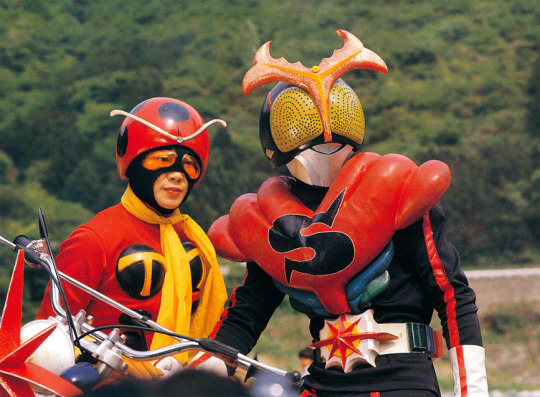
Astruc thinks "binge-reading" comics makes him an expert on the superhero genre, which it really doesn't. "Binging" on something means moving on to the next piece as soon as you're done with the previous one. It's consumption where the point is to be done as quickly as possible with no time for thinking about what you're eating/reading/watching. He claims he "binged decades of comics" which is meant to make it sound like he read a lot of comics, but he mustn't have put much thought into what he was reading, since he says incorrect stuff like "Miraculous is like having Catwoman and Spider-Man in the same comic, except the genders are reversed" (Spider-Man comics have a prominent cat-themed female ally character already) and "girls are always sidekicks to boys" (all "girl versions" of boy heroes are actually independent heroes, especially Batgirl) all the time.
These mistakes are also really obvious if you ever watch or read anything based on the Batman or Spider-Man comics other than the movies, so they shouldn't have happened if Astruc really did read "decades of comics" as he claims. Black Cat is a prominent supporting character in Spider-Man comics and shows up in almost every cartoon adaptation and is even a love interest. Meanwhile, Batgirl is almost always depicted as an independent agent and not someone who answers to Batman, with the one notable exception of The Batman where she basically takes the role of Robin because DC executives were scared of having more than one version of any character in cartoons at the time. In fact, just looking at DC's comic lineup tells you that Batgirl has had several of her own solo books with no Batman necessary.
Basically, unless Astruc's "binge reading" was really more just glancing at the comics, he really should know more about the genre he claims to be subverting. His understanding of the superhero genre is on the level of a Buzzfeed article back when those were still a thing; people complaining about a movie or genre they've never watched and everyone thinking their distorted idea is the reality. Remember when "Belle has Stockholm Syndrome" was a common take on Beauty and the Beast? "Girls are always sidekicks" is that exact thing, people who have never read or watched Batman look at the name "Batgirl" and think she's a sidekick because she was inspired by one of the most famous superheroes ever both in and out of universe. It's like Astruc has heard other people talk about comics more than he has actually read them.
I'm saying of course he doesn't know about a super sentai giant like Kamen Raider. He doesn't even really know anything about the things he claims are direct influences on his work, like Batman and Spider-Man, the two most well-known western superheroes.
23 notes
·
View notes
Text
The Power of Dune Part Two’s Final Act: Stepping Away From the Messiah
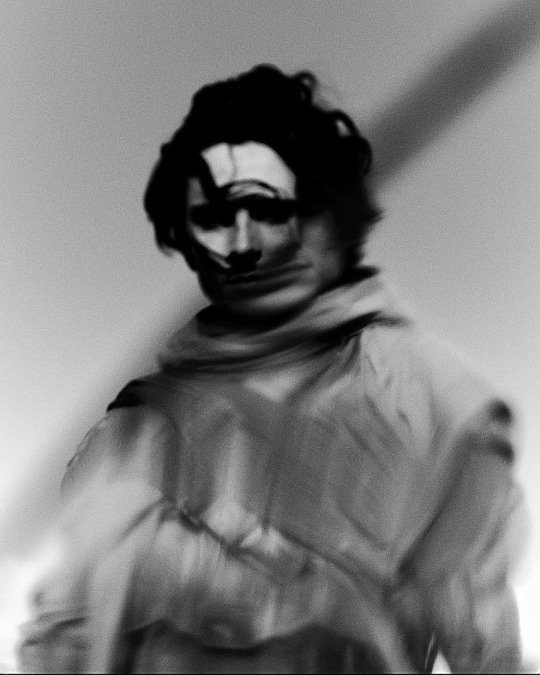
Stunning photo by Jack Davidson
So I didn't think I would be talking about Dune in my first post for this page (considering that I intended it to be more Star Wars focused and also since I haven't read the Dune books yet), but the final stretch of this movie has been on my mind ever since I left the theater a few weeks ago.
(Spoilers for Dune: Part Two)
It's strange in the sense that we are suddenly distanced from Paul, and also in that the climax seems to accelerate the story faster than ever before. So far (in both movies), there has been a pretty strong focus on Paul and a very deliberate pace that let all the plotlines simmer. It’s a masterclass of immersion, both technically and emotionally. The humanity of its characters aren’t lost in the many elements at play. Paul is a character whose empathy and how it makes him conflicted with what is placed before him make him quite likable. Spending so much time with him, Chani, and Stilgar makes us grow attached to them, not just because they’re the heroes, but because they feel real. And yet we’re pushed away. In the third act Paul's dark transformation happens swiftly (you’d initially think from how it’s shown the water of life turns you evil), and by the story’s end we only see Paul from a distance in the eyes of other characters, unable to see him resolving the concerns we’ve wrestled along with him, unable to get a good read on his motivations anymore. The final battles with our heroes happen rather quickly as victory over the Harkonnans and the Emperor comes pretty easily. On one hand this shift could feel unsatisfying, and the first time I watched the movie I was a little unsatisfied. But I’m not here to say this is a fault of the movie; in fact, this shift results in something greater happening, and it’s the most powerful triumph of Part Two’s story.

By the end, even when we do zoom in on Paul we're not sure what's really behind his intensity. (All the Dune screencaps are from Dune Perfect Shots 4K on Twitter).
Dune’s story up until this point, from what I know about these two films at least, is all about complexity, discerning the many variables, the need to carefully monitor both these variables and one's own behavior. The importance of mastering oneself. (This video by Alt Shift X talks about this really well, and it definitely helped me understand this aspect of the story better). But Paul’s tests, like the Gom Jabbar in Part 1 and the worm ride in Part 2, carry not just that significance but also the danger of a prophetic horror being more and more certain. Therein lies an irony - you can gain power but tied to it is something much larger that’s out of your control. This becomes pretty key to the whole story, and there’s something I was reminded of that helped me put all this into perspective. I brought this up in my first-time watch review too, but I think I have more to say about it now. But bare with me as this might end up being convoluted.

In one of my classes this semester we read the poem “The Promised Land” by Gabeba Baderoon, and I was really struck by this image that it alludes to called the Angel of History. Described by Walter Benjamin based on the painting Angelus Novus by Paul Klee, it depicts an angel whose wings get caught in the winds of a destructive storm “blowing from Paradise.” It’s trapped in the storm’s momentum going forwards with no way to escape. All the while, its head is permanently twisted backwards, forced to watch the wreckage of the storm, named progress, gathering below it. From what we discussed in that class this disturbing image suggests that all the events of history, all that we do or achieve or create, is not a series of events affecting each other, but instead one ever-building catastrophe barreling forwards. Both the Bene Gesserit’s century-spanning machinations and Jessica’s usurping of it all by birthing a boy. Whether the Harkonnen house or the Atreides house controls Arrakis. All of these are merely before a future that’s larger than any of them individually; the messiah and his holy war will come regardless. Even if it’s towards her own end rather than that of the Bene Gesserit, Jessica still uses their propaganda to facilitate his rise. The two houses end up converging anyways in their family trees with the Baron, and Muad’dib Atreides embraces it, merging the two families’ ideologies like the Kwizatz Haderach was always intended to. Whether his sudden ruthlessness is him embracing his desire for revenge or actually a strategic choice after sifting through the past and futures laid out, we’re denied of knowing for sure as we look at him from afar, and this denial by the film questions if the answer even matters much. The Angel image and the movie’s narrative dispel the idea that we have the capability to easily fix things when we make progress. It’s a notion that renders reasoning or means as having little ability to empower, envisioning us all moving towards the same horror anyways. It suddenly renders all the complexity of the plot and these competing ideas and factions inconsequential. And I don’t mean that in a bad way — it’s crucial to what the film is really getting at.
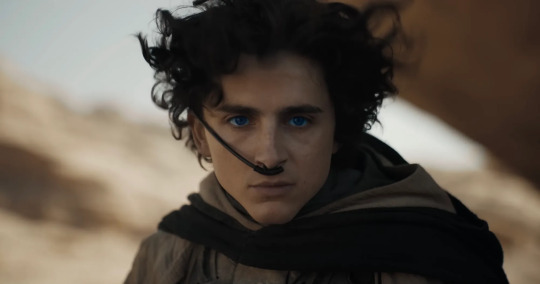
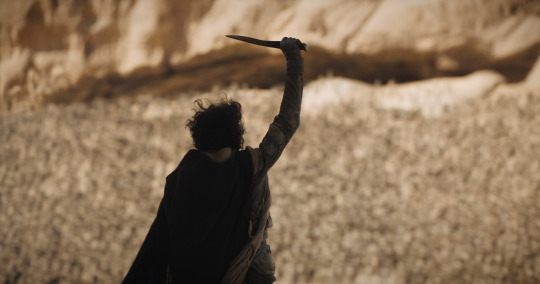
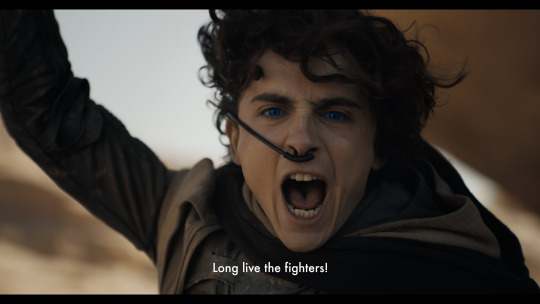
"We're Harkonnens... so that's how we'll survive. By being Harkonnens."

“You of all people should know there are no sides, Reverend Mother.”
Now, it’s fair to question the nihilistic bent of this (are we in the real world truly powerless to stop to this continuous catastrophe???), but the Angel of History and Dune use the stories they put forth as cautionary tales where that all-encompassing bleak endgame are meant to deconstruct our notions of progress and control. If we are powerless to shape history, how strong is the power we wield? And how good is the power we wield? As we strive for “paradise” and celebrate attaining it we often forget what happened as we got there, and we fail to see where we really are. If the reasoning for our actions doesn’t empower us, the effects of them in turn are even more debasing. The Baderoon poem that alludes to the Angel of History does so to examine this too. In its discussion of the end of apartheid and the ushering in of a democratic South Africa, “The Promised Land” weaves in the legacy of the jazz pianist Moses Molekelwa, who, despite influencing the poem’s speaker’s attitudes towards social progress (and appearing as an idol in that sense), is shown as getting off the hook in the eyes of history for strangling his wife to death. The triumph of his music is remembered while his wife’s murder is willfully forgotten, and the poem concludes that “our forgetting is also our home, which is why we will never leave the old country.” Baderoon warns of when the celebration of progress doesn’t factor in the ugly parts we still carry with us into the future, and her allusion to the Angel of History works to convey that danger. (Obviously the real anti-apartheid struggle of South Africa is very very different from the story of Dune, and I wouldn’t want to compare them to each other. Dune’s exploration of complicated progress instead speaks more towards the dangers of charismatic leaders and the co-opting of a cause). The only thing I want to highlight is just that Dune, Baderoon’s poem, and the Angel of History all hone in on the need to not lose sight of the now.


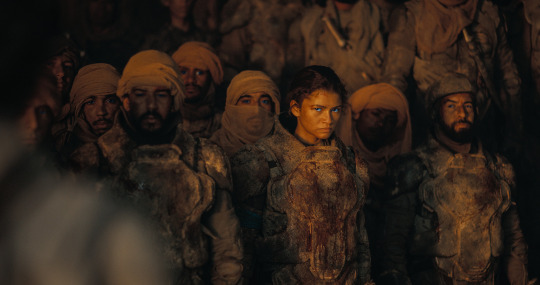
This is why the third act’s shift away from Paul works so well. The film doesn’t show people “forgetting” necessarily, but we do see them caught in the fervor without acknowledging what’s happening to them. Paul is an exception in that he sees it all: his arc sees him changing his perspective on the destiny laid ahead and taking control to ensure it happens on his terms. He doesn’t really turn evil, but since we’re denied of seeing past his new icy exterior as he looks ahead with his prescience, the film instead turns us back to the now, like the angel looking behind. We're with Chani now, the only (non-psychic) person who’s seeing this all. We already believe in Paul’s goodness. If we were to see what Paul sees and fully understand his reasoning, it would make it easy for us to downplay the costs. The story thus has us focus on the consequences of Paul’s path beginning to gather in real time, the Fremen being exploited as they are led into a coming bloodbath by their messiah.
And this is the sadness of it all, right? Things that were once honorable, like Jessica protecting Paul like she promised Leto and the legacy of Leto that Gurney hopes for Paul to carry with him, are twisted into foul and manipulative actions. Good intentions and real connections, like Paul’s empathy, his and Chani’s relationship, and his and Stilgar’s friendship, all give way to the storm.
The quickness of the third act’s events compounds this danger. The path Paul takes may be the best possible option after considering all the variables, but the story doesn’t revel too long in the glory of his successful leadership and strategy.

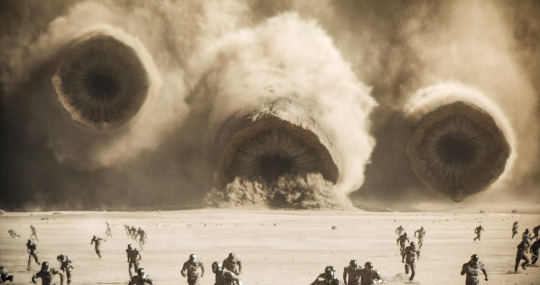
The awe-inspiring images speak not to just heroism but something volatile and intoxicating. It's not that the film oversimplifies the moral dilemmas at stake, but by letting the big battle, Gurney slaying Rabban, and Paul slaying the Baron happen all too easily, it removes the focus from only being the powerful exploits of Paul and the Fremen and adds emphasis on how they become like Harkonnens and how the Fremen become entrenched in Paul’s conquest. The Harkonnen bodies are burned like the Atreides were before them, and the Fremen Fedaykin ultimately fight carrying the Atreides banner instead of their own. They lose sight of this fact as they place all their faith in Paul, their cause and faith co-opted. It happens so fast and it can’t be stopped. We’re caught in the momentum of the storm raging, pushing us forward, and at the same time the film adjusts its focus to ensure that we don’t forget to recognize the consequences of Paul’s choices. This is what I find so compelling about this movie — we’re given a story that details the complexity of all things and also ultimately denies complicated factors and necessary evils of becoming excuses that wave the wreckage of progress away.
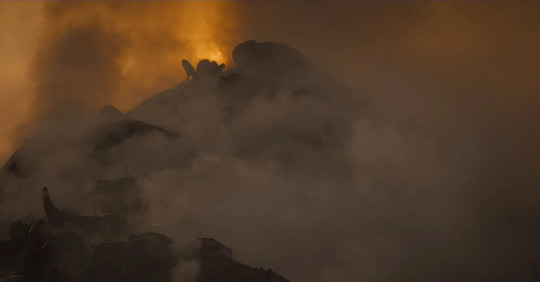
Hopefully this was enjoyable to read and wasn't pretentious or anything! Lemme know what you think about the movie!
#dune#long post#dune part two#dune movie#dune 2#dune part 2#dune 2024#paul atreides#kwisatz haderach#lisan al gaib#angelus novus#angel of history#determinism#frank herbert#denis villeneuve#gabeba baderoon#movies#movie review#movie discussion#movie analysis#film#film analysis#film discussion#media analysis#favorite movies#letterboxd#cinema#movie stills#movie photography#movie adaptation
9 notes
·
View notes
Text
The antagonism that characterized the master-slave relationship involved the hostility of the master to the slave as well as the hostility of the slave to the master. If Briseis did not love Achilles, Achilles does not appear to have loved Briseis. Evidence for his feelings appears in the angry rejection of Agamemnon’s offer of compensation, which Odysseus presents in the embassy episode, and in Achilles’ own lament for Patroclus in Book 19. In the response to Odysseus, the hero continues to rage at the insult done his honor when Agamemnon took away Briseis, his allotted prize. Achilles rejects the compensation offer, which would include the return of Briseis, whom, Agamemnon will swear by solemn oath, he has not touched. [40] Though he has rejected an opportunity to take back Briseis, Achilles refers to her as his alochos, a word that ordinarily indicates a wife. “He has taken and keeps my dear wife,” Achilles says. “Let him lie beside her and be happy.” In indignation, he notes that the reason the Greeks are fighting the Trojans in the first place is to defend Menelaus’ marriage to Helen. He asks rhetorically, “Are the sons of Atreus alone among mortal men the ones who love their wives?” He tells Odysseus that he loves Briseis, from his heart, even though she is his war-prize: ἔχει δ’ ἄλοχον θυμαρέα· τῇ παριαύων τερπέσθω. τί δὲ δεῖ πολεμιζέμεναι Τρώεσσι Ἀργείους; τί δὲ λαὸν ἀνήγαγεν ἐνθάδ’ ἀγείρας Ἀτρεΐδης; ἦ οὐχ Ἑλένης ἕνεκ’ ἠϋκόμοιο; 340 ἦ μοῦνοι φιλέουσ’ ἀλόχους μερόπων ἀνθρώπων Ἀτρεΐδαι; ἐπεὶ ὅς τις ἀνὴρ ἀγαθὸς καὶ ἐχέφρων τὴν αὐτοῦ φιλέει καὶ κήδεται, ὡς καὶ ἐγὼ τὴν ἐκ θυμοῦ φίλεον δουρικτητήν περ ἐοῦσαν. 9.336–343
Still, Achilles later refers again to Briseis as the prize and symbol of his honor, or geras (367). He does speak of marriage, that is, when he rejects the offer of marriage to one of Agamemnon’s daughters and, thus, a political alliance with powerful Agamemnon himself. In rejecting this offer, Achilles uses several terms that refer to a legitimate wife. Such a wife, however, would not be a daughter of Agamemnon, much less Briseis, who as a captive taken in war had no political benefit to confer. If he returns home, Achilles declares, his father Peleus would find him a wife (gynaika). There are many women, he says, daughters of leading men in Greece or Phthia. He would make one of them his dear wife (philen akoitin) (9.388–397). It is from there, Achilles declares, in concluding his rejection of the marriage offer, that his heart was eager to take a lawfully wedded wife (mnesten alochon), a fitting spouse (eikuian akoitin), and to enjoy his inheritance from Peleus: ἔνθα δέ μοι μάλα πολλὸν ἐπέσσυτο θυμὸς ἀγήνωρ γήμαντα μνηστὴν ἄλοχον, ἐϊκυῖαν ἄ��οιτιν, κτήμασι τέρπεσθαι τὰ γέρων ἐκτήσατο Πηλεύς· 9.398–400 The direct declaration of love here is posturing rather than an expression of sincere feeling. In the context of rhetorical engagement with Odysseus, Achilles finds it useful to equate Briseis, a slave concubine, with Helen, a wedded wife, in order to depict Agamemnon as another Paris, a man who steals other men’s wives. Later, in rejecting marriage to one of Agamemnon’s daughters, a marriage that would constitute a political alliance, Achilles notes his preference for a daughter of (and alliance with) another Achaean strongman over hated Agamemnon. Nagy notes a tradition that emphasized the rivalry between Achilles and Odysseus as respective representatives of the opposed concepts force and guile, bie and metis. Nagy remarks on the irony of the embassy episode in that Odysseus, famed for his metis, implores Achilles to return with his bie to the fight. But there is a corresponding irony: Achilles’ words to Odysseus, an artful display of rhetorical metis rather than a sincere declaration of love for Briseis, push Odysseus back on his own turf, rhetorical guile. [41] It is also relevant to this reading that in Book 1, when Achilles complains to Thetis that Agamemnon had dishonored him by taking his prize, his geras (1.355–356, ἦ γάρ μ’ Ἀτρεΐδης εὐρὺ κρείων Ἀγαμέμνων / ἠτίμησεν· ἑλὼν γὰρ ἔχει γέρας αὐτὸς ἀπούρας), he does not complain to his mother that Agamemnon had taken away the woman he loved, still less, the woman he wanted to marry. It would be curious if Achilles bares his heart in this matter not to his mother, but to Odysseus, a traditional antagonist. Granted, Briseis is important to Achilles as a geras, a symbol of his honor. Whatever his feelings are for her, in the embassy episode they appear subordinated to this.
Indirect evidence for Achilles’ feelings appears in his own lament for Patroclus, which formally aligns with that of Briseis. [42] After refusing to eat and drink, Achilles addresses his comrade in the presence of the Achaean leaders and, presumably, Briseis and the other enslaved women. He remembers how Patroclus used to prepare the meal before the battle—but now he is dead, “pierced through by the sharp bronze” (19.319, δεδαϊγμένος), a formulaic observation of the fact of death that connects Achilles’ lament to that of Briseis. He tells Patroclus that it is harder to bear his death than it would be to bear the death of his father or even his son. For he had always wished that he alone would die at Troy, but that Patroclus would retrieve Neoptolemus from Skyros and present him with his inheritance, his slaves and his great house. πρὶν μὲν γάρ μοι θυμὸς ἐνὶ στήθεσσιν ἐόλπει οἶον ἐμὲ φθίσεσθαι ἀπ᾿ Ἄργεος ἱπποβότοιο 330 αὐτοῦ ἐνὶ Τροίῃ, σὲ δέ τε Φθίηνδε νέεσθαι, ὡς ἄν μοι τὸν παῖδα θοῇ ἐνὶ νηὶ μελαίνῃ Σκυρόθεν ἐξαγάγοις καί οἱ δείξειας ἕκαστα, κτῆσιν ἐμὴν δμῶάς τε καὶ ὑψερεφὲς μέγα δῶμα. 19.328–333 Pucci suggests that Achilles’ declaration here is a response to Briseis’ reference to the marriage Patroclus told her he would arrange. The bereaved hero declares that he never intended to return to Achaia, much less (by implication) to marry Briseis. [43] Briseis would indeed be taken to Phthia, but not as his wife, rather as a slave inherited by his son along with his other possessions. He never intended to marry her as a legitimate wife.
If Achilles never intended to marry Briseis, Patroclus’ promise of such a marriage becomes suspect, intended, perhaps, to deter the slave from socially disruptive mourning rather than to give her reason to hope, if—and this is to be doubted—Briseis did indeed herself hope for marriage to Achilles. Her final appearance is in Book 24, after Priam and Achilles have mourned their individual losses together. Priam goes to sleep in the forecourt of Achilles’ tent, but Achilles goes within to sleep with the fair-cheeked Briseis at his side (24.675–676): αὐτὰρ Ἀχιλλεὺς εὗδε μυχῷ κλισίης ἐυπήκτου· / τῷ δὲ Βρισηὶς παρελέξατο καλλιπάρῃος. Readings that posit a positive affective relationship, perhaps even love, between Achilles and Briseis see here the noble master and his noble slave (but not a “real” slave) aligned in grief and common loss. [44] The alternative reading I have promoted in this essay argues that no such affection existed, but rather the hostility that often characterized master-slave relations. Briseis departs unwillingly to sleep with the man who killed her husband and destroyed the life she knew. Achilles tries to find solace with a woman whom he does not love and who, he likely knows, does not love him. Sleeping with the enemy is cold comfort indeed.
Briseis and Andromache Enslaved: Sleeping with the Enemy in Greek and Roman Epic by William M. Owens.
Reading this guy's text was really a positive surprise! Like, I agree with him immensely. I'm sorry, the whole thing about Achilles the tragic lover who lost his beloved wife in The Iliad narrative always sounded weird to me. There's basically only one piece of evidence of this so-called love in The Iliad, which is this speech by Achilles in Book 9, and all the other moments pretty much contradict what he says (not mentioned in this excerpt, but at one point Achilles even wishes Briseis were dead while talking to Agamemnon. And as mentioned in this text, Achilles even says that Agamemnon should sleep with Briseis, and regardless of whether he was being dismissive or not, it is at least strange behavior for someone who has lost the woman he loves to want the man who took her from him by force to sleep with her). I admit I read it focused on the Briseis parts because that was the topic I was looking for, but now that I've had this positive surprise I'm really interested in going back to read the Andromache parts and see what Owens has to say. I'll probably avoid posting entire parts of Andromache because at this rate I'll end up posting his entire work and I think it would be better if people actually read it (it's available online for free! Just click the link), but I'll probably summarize his idea if I do post about it. It's also refreshing to see someone analyzing these contexts focusing on how it affects Briseis rather than how it affects Achilles, as was the case in most of the texts I read (whether to talk about his honor or to paint him as a tragic lover).
5 notes
·
View notes
Text
Jujutsu Kaisen Season 2 Episode 21: I Am You
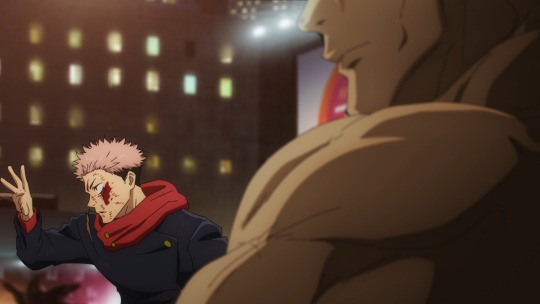
I think it's pretty funny that I haven't been active at all this week due to life, but my first post since the question about my activity regarding JJK, is a post about JJK. Just a bit of irony.
Anyways, this was originally just going to be a short complaint about narrative flops in this episode (that I thought I might not even write about), but I have a feeling it's going to end up a pretty long winded complaint about the handling of key characters at the end of this season. So here we go.
I'll just get right into it with the egregious ending of Itadori vs Mahito here.
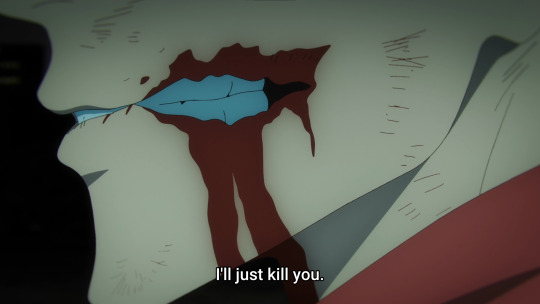
I think that if for a minute you've understood who Itadori is, what he is, that this scene will immediately rub you the wrong way.
Why, on god's green earth, would you pull Sukuna into this conversation? Why would you make a reference to Sukuna with the words coming from Yuji's mouth in this context.
Better yet, why would you paint Yuji as a looming shadow above Mahito in this moment?
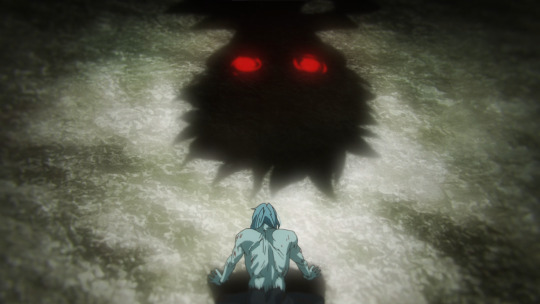
It's just an egregious and wasteful depiction of Yuji that takes his character in the complete opposite direction.
Our boy Yuji here isn't some grand hero, he is not some otherworldly threat to Mahito. He is, quite literally, the antithesis to Mahito. These are words that Yuji himself states, within this very episode.
Yuji is a cog in the machine of the Jujutsu world, he is a single piece of the puzzle that creates a bigger picture. He is the wolf hunting the rabbit on sheer instinct. There is no greater goal, there is no lofty ideal. It is clear cut and simple, that this is Itadori accepting his fate, accepting his life. Using the hole in his mouth to show him carrying the carnage of Sukuna on his back? Great idea. Using that imagery at the completely wrong time though? I can't imagine why they would choose to do that.
His entire character arc through Shibuya is to own his life at this stage, to say that everything he's done is his own actions, and that he'll keep pushing until he has nothing left. Not that he'll get stronger, not that he'll save his friends or the world, but that he'll keep. killing. curses.
It just sort of blows my mind to see how they would handle something so expertly clear cut from the manga. Gege's vision was so incredibly well defined and expressed in these finals moments of the pair. It was pure art, and absolutely earned its status and popularity within the fandom.
I won't lie, it hurts. Not physically, but it hurts. And then there's just a bunch of odd animation work with the sequence, like Mahito's mouth and eyes shaking at a million miles per hour. There's obviously some really great animation and work throughout the episode, and it's not so much that it's poorly animated, but just incorrectly animated. These characters can feel insanely different just from cut to cut alone, and when the smallest details can make the biggest differences, those variances can really add turbulence to their character arcs.
Anyways, onto the next topic of discussion: Todo. I love this man. Hands down, my favorite side character through all his time on the page and screen. Incredible character to put beside Yuji for balance.
But.
The production ran away with him a little too much. I get it, it's hard to not go crazy when you have the potential to, and in a vacuum I adore the two big sequences he's gotten in the last two episodes. However, I think you have to be pretty crazy to think that Todo's Takada Tandem (patent pending) is a good fit for the episode.
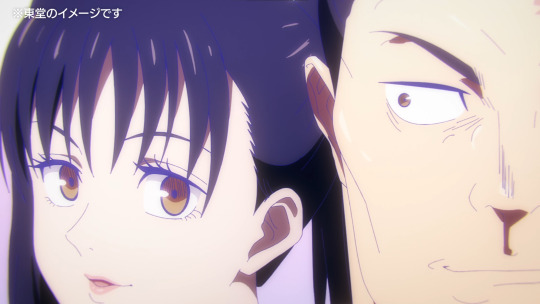
Todo and Takada are an... interesting pair. Todo doesn't "use" Takada too much, so it makes it hard to really define a proper line with it, so let me put it another way.
Before Yuji was in the picture, Takada was Todo's #1 by a mile. With Yuji in the picture though? Sorry Takada, a brother's more important than an idol.
So, you could imagine my surprise when Todo tries to steal Yuji's thunder with a Takada powered delusion. I mean, he's fighting side by side with his brother, the person closest to him in the world.
Todo went to Takada to ask a question in his season 1 dilemma with Hanami because Yuji was out of the equation. Yuji was not at risk, it was not "Yuji's fight". Where Todo was leading Yuji with Hanami, it is absolutely the other way around with Mahito. And I mean, the most obvious thing to explain that with is the fact that Mahito basically shoves Todo to the side to start.
Regardless, the idea is that Yuji's in the pilot's seat, he's the one that knows the most about Mahito, he knows how to fight him. Todo is there to support his brother. Bringing out Takada, stealing Yuji's thunder, and weakening the balance and chemistry between our brothers just confuses me to no end.
Like, just simple things like Todo's hand. Dude has 3-5 business days to chop it off in the anime, and realizes on his own to do so. Kudos to Todo and his insane IQ, but the entire idea presented in the manga is that Yuji is faster at warning Todo than Todo is at grasping what's going on. It's just things like these that undermine the significance and value of this fight, and consistently appear in the episode.
Completely baffles me why it happens, but it's just a further extension of the narrative trend of stirring the pot where no stirring is needed. And it really hurts. Powerscaling is nonexistent, fights have ended up vastly different in tone and execution, and core narrative elements have just all sorts of these little inexplicable changes that undermine that masterful work of Gege through this arc. We're almost across the finish line, and all I'm hoping for is for it to be over at this point, which is flat out depressing.
#jujutsu kaisen#呪術廻戦#jjk#sorcery fight#gojo satoru#geto suguru#anime review#anime and manga#nanami kento#kento nanami#shibuya#shibuya arc#jjk shibuya arc#jjk season 2#shibuya incident#anime#todo aoi#yuji itadori#itadori yuuji#mahito
11 notes
·
View notes
Text
Enchant the Heavens review
I've been revisiting a lot of my favorite old historicals since my beloved kitty Peggy died about a month ago, and one of them is Enchant the Heavens by Kathleen Morgan.
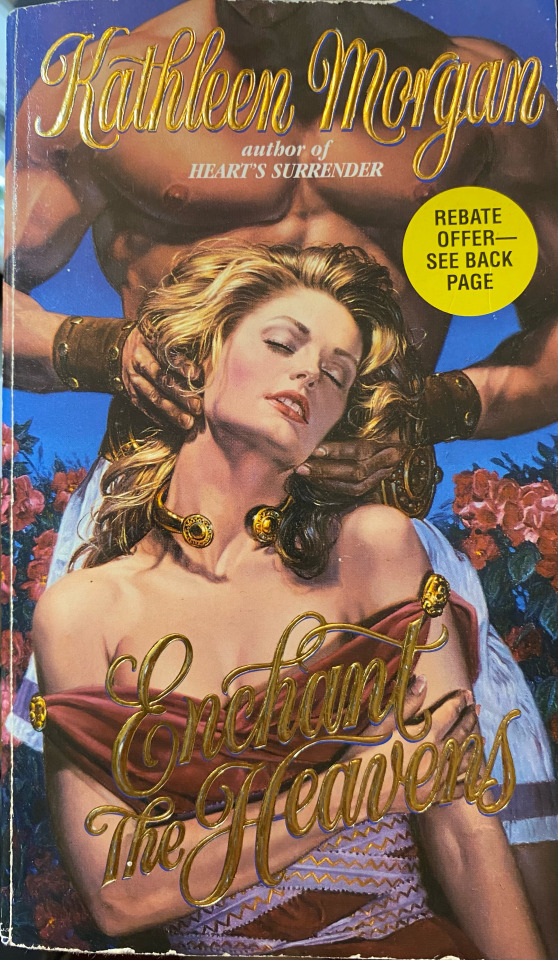
When I was a college student I loved romance novels, particularly historical romance, even though most of my friends at the time thought it was ridiculous and made fun of me for reading them. It made me even more stubborn, and I clung to the genre like a barnacle onto the hull of a ship. However, there was one book at the time that was too cheesy even for me, and that was Enchant the Heavens.
I found the cover embarrassing. Look, my teenage self thought, the hero’s hands look like he’s about to crack the heroine’s skull! And the hero, Marcus, was so earnest. The book was so earnest. The culture at the time was saturated with snark and irony, and sadly, I was not immune. I set the book down.
Years later, in 2011, I revisited Enchant the Heavens, and I found myself… well, enchanted. I was swept away by the epic nature of the story and the endearing characterizations. And I reread it just a week ago. I admit, I was afraid the suck fairy might’ve visited it over the intervening years. But I found myself devouring it happily just as I did all those years ago. And it’s good.
Enchant the Heavens was the first novel Kathleen Morgan ever wrote, and it was a labor of love. It’s a big, passionate, visceral, breathtakingly earnest romance.The story involves a British chieftain’s daughter, Rhianna, and the Roman governor’s nephew, Marcus, during Boudicca’s revolt, and their love is an anguished, star-crossed love that takes a great deal of blood and tears and hard work to resolve. Unlike most romances set during this period, the Celts aren’t romanticized into nature-loving New Agers, and the Romans aren’t evil. And neither the heroine or hero give up their cultures or identities in the end; in fact they work on uniting their communities in the aftermath of war. It’s mature and refreshing.
The language does have a lot of archaicisms that kind of annoying. ‘Twould! ’Twas! Naught! Okay… You just have to run with it. But if you’re willing to dive in, there is a lot to love about it. Rhianna is not afraid of revenge, or using her sword, which is really delightful (to avoid spoilers, I won’t tell you who she kills). Marcus is a reasonable guy too, but there’s just the right amount of deeply felt angst that is perfect for a story about forbidden love. Sometimes I feel that Marcus and Rhianna verge on being idealized archetypes then actual people, but it kind of fits with how epic and operatic the story is. (It really captures the vibe of ancient Irish stories like Deirdre, which was the author’s intention.) The author walks the line of having them be larger-than-life figures, but they still grow and change, from a thoughtless girl and a career-driven aristocrat to a responsible, compassionate leader and a humbled man ready to sacrifice his dreams to help his lover and her people.
The research put into this book isn’t perfect— towards the end of the book, there’s an hummingbird, native to the Americas, in Rome — but it’s thorough and thoughtful, and I liked the depiction of the historical figures. For example, the depiction of Nero, who has a brief and memorable cameo, is almost miraculous in how… sensible it is (and ahead of its time given this was written long before the current reassessment of Nero and the 2020 show at the British Museum). There’s no orgies or lions or gladiators or martyred Christians or any other cliches that I’ve seen over and over again in the few historical romances set in this period. It’s astonishing.
Anyway, this book is long. It’s also epic and sweeping in every possible way, and I have a feeling a good chunk was left on the cutting room floor. I would kill to have the original, unedited draft. Rhianna’s relationships with her friends Eilm and Cordaella are given short shrift. Also I feel the destruction of Camulodunum, and Rhianna’s role in it, was also cut a lot. I would have liked to see more of that, and Rhianna coming to terms with how her actions affected innocent civilians.
But the pacing, given how long it is, is surprisingly tight. I thought the consistent themes of freedom, symbolized by the goshawk, was really beautifully done; not heavy-handed, but subtle; and the story really embraces the pagan religions of the time in a way that’s delightful. There’s so much I can’t get into, or this review would be twice as long. There’s battles, druids, psychic visions, continent-spanning political intrigue, murder, and possibly supernatural white boars sent by the gods.
And the ending is really satisfying. I wish it were 20 to 30k longer, but it’s great as it is. It’s an absolute banger of a story. It’s not perfect but I’d give it a 4.5 out of 5 stars.
Of course, what really sucks about it all is that this was going to be the beginning of a series, and the hero’s best friend Quintus was going to get a sequel.
There was, in fact, one sequel (Enchant the Dream) featuring the heroine’s brother Cerdic. But then the author converted to Christianity sometime in the late 90s, and her entire pre-conversion historical and fantasy backlist are completely unavailable. (Of course, her post conversion backlist is available.)
It pisses me off so much, because Enchant the Heavens is so good! And I wanted to see Quintus’s story! But that’s never going to happen. And there’s never going to be a legal digital copy of this book either, because the author has seemingly disavowed it.
But we’ll always have Enchant the Heavens, and even if Morgan wants to forget her pagan past, I am grateful she wrote this book. I highly recommend it.
13 notes
·
View notes
Text
sorry im not home right now im walking into spiderwebs
read it on AO3 at https://ift.tt/JluGxC2 by ditzybat With his infamous Parker luck, he managed to find himself in the one city where meta-humans (or enhanced) aren’t welcome, all because the local hero (Batman, is he a bat? Ridiculous name, at least Peter earned his name, he’s a humanoid-spider!) dislikes them. That’s probably some sort of racism… or abelism… okay, it’s an ism. At least Peter isn't running around in leather and bat ears like some sort of kinky furry. — Peter Parker traverses universes with a green haze clouding his vision and an infinity stone embedded in his very core, gets adopted by crime lord, stalked by birds of prey, aliens, and considered an enigma the bats can’t quite crack Words: 10677, Chapters: 1/?, Language: English Fandoms: Spider-Man - All Media Types, Spider-Man (Tom Holland Movies), Batman - All Media Types, DCU Rating: Not Rated Warnings: Graphic Depictions Of Violence Categories: Gen Characters: Peter Parker, Jason Todd, Dick Grayson, Tim Drake, Duke Thomas, Stephanie Brown, Cassandra Cain, Harry Osborn, Johnny Storm, Felicia Hardy, Bruce Wayne, Natasha Romanov (Marvel), Loki (Marvel), Stephen Strange, Tony Stark Relationships: Peter Parker & Jason Todd, Dick Grayson & Peter Parker, Peter Parker & Natasha Romanov, Tim Drake & Peter Parker, Peter Parker & Duke Thomas, Loki & Peter Parker, Cassandra Cain & Peter Parker, Harry Osborn & Peter Parker, Peter Parker & Johnny Storm, Felicia Hardy & Peter Parker, Peter Parker & Johnny Storm & Harry Osborn & Felicia Hardy, Minor or Background Relationship(s) Additional Tags: Dimension Travel, Soul Stone | Soul Gem (Marvel), Peter Parker Needs a Hug, Peter Parker Acts Like a Spider, Found Family, Crack Treated Seriously, Angst, Hurt/Comfort, Spider Mom Natasha Romanoff, BAMF Peter Parker, Peter Parker and His Mini Harem, not really but you’ll see, cherry picking canon, Not Canon Compliant, Dick Grayson is Peter Parker's Biological Parent, Dick Grayson Needs a Hug, Past Peter Parker/Johnny Storm, Past Felicia Hardy/Peter Parker, Past Harry Osborn/Peter Parker, Romani Dick Grayson, Past Rape/Non-con, Dick Grayson and Richard Parker (Marvel) are the Same Person, Court of Owls, Dramatic Irony, Song: Spiderwebs (No Doubt) read it on AO3 at https://ift.tt/JluGxC2
3 notes
·
View notes
Text
Kiss Me Deadly (1955)
A private investigator meets a hitchhiker who soon turns up dead and leaves behind a clue to a mystery than a bad organistation are seeking to solve.
The protagonist is unusual in that his methods for finding out the truth don’t play by the rules that the other noir characters expect of him. Instead of bargaining, bribing, and otherwise keeping to the dubious ethical code of typical heroes or anti-heroes, he’s fine with beating answers from people when they get too greedy or stubborn.
Even though he’s different in some aspects, the lead is still wooden in terms of keeping most emotion from showing, as many PI characters are in this genre. The mystery itself is fairly simple despite being gilded with the frippery of poetry and greek myth parables; the solving of it is less interesting than the methods used to do so.
A few other aspects are unusual, most notably the type of treasure everyone is seeking. There are a few clues as to its nature but the best part of it is that half the characters are willing to kill for it without knowing exactly what it is, demonstrating a pure kind of greed and allowing for the irony that the item is useless to most of them.
As an ending, the style and imagery are different from the usual crime noir fiction, however the ends are about what one would expect: blind avarice leads characters both good and bad to their doom and sex is depicted as an evil tool to tempt the alrady pretty violent characters onto an even worse path.
3/10 -This one’s bad but it’s got some good in it, just there-
3 notes
·
View notes